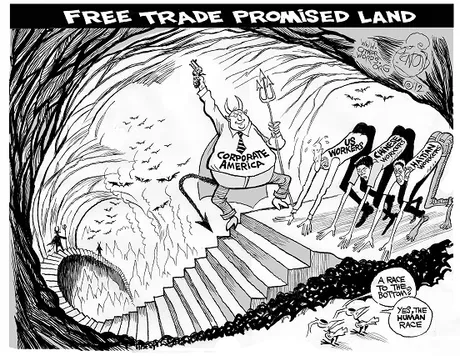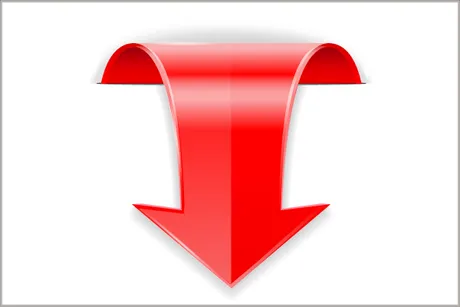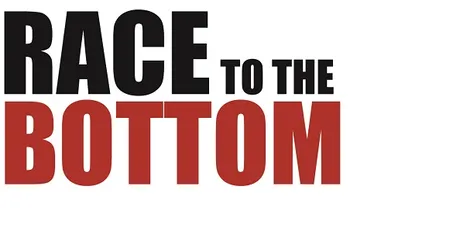
I keep making reference to The Race to The Bottom, but I don't have an article to link to in order to clarify what I'm talking about. This is that post.
Traditionally, the race to the bottom is a metaphor involving lowering ones standards in order to sell out and make money.
a race to (or for) the bottom phrase of race
- A situation characterized by a progressive lowering or deterioration of standards, especially (in business contexts) as a result of the pressure of competition. "unsustainable tendering practices had created a race to the bottom among contractors"
For me the term is taking on a whole new much more positive meaning when in reference to cryptocurrency. Before now, the bottom represented the lowest standard. Now, it represents the lowest friction.

The Blockchain and cryptocurrency are proving that middle men are obsolete and can be replaced by smart money. We no longer need escrow services. We no longer need banks. We no longer need any trusted middle man. The middle man is being replaced by digital contracts enforced by cryptography.
This is a revolutionary development, but the space is so new and underdeveloped that it's causing uncertainty and greed to proliferate. This dynamic puts a lot of people off and makes them assume that crypto is a scam. Block.One doesn't need four billion dollars to develop EOS, but they took it regardless. Now they own both 10% of EOS and 10% of Ethereum, which looks bad for decentralization.
On a side note I'd like to point out that the claims of EOS attacking Ethereum are pretty outlandish. Why would Block.One waste money attacking a platform that they own 10% of? EOS is practically a blank slate platform right now. What can you even do there? I registered my ERC-20 tokens months ago and I haven't even checked my wallet yet to even confirm if they are there. There is no reason to attack a "competitor" if your product isn't even up and running yet. Could be a rogue EOS whale I guess... but that is a lot of money to waste for such little (none) payoff.

Anyway, back to the topic at hand. The overhead of cryptocurrency is extremely low. We now have the power to create, maintain, and develop worldwide currencies with "big" teams as small as 30 people. What does this mean for the future of crypto? It means that projects are charging too much. ICOs are keeping too many coins for themselves because they can get away with it, but it won't be like this for long.
Any development team in the world can get together and massively undercut any of these greedy projects on the market. This is especially relevant when you consider that all these projects are open source. If EOS proves to be a superior product but isn't decentralized enough a team will fork it with decentralization as the primary goal. This logic applies to all blockchain projects.
What's the best part of forking a project with the intention of decentralization? First of all, if you succeed this new fork will be considered a commodity instead of a security, providing more lax regulation. Better yet, it would be declared a currency over a commodity. Second, both projects now have a cooperative incentive to be the best project. I say cooperative over competitive because competition is falsely projected onto the cryptosphere. Both projects would have similar open source code and any of them could incorporate the others at any time.
There is no guarantee that the new project would be better than the old one. Perhaps the dev team of the first project is simply far more skilled than the fork devs. In this case decentralization didn't even matter, the old chain is still superior.
Best case scenario is that the two forks eventually come to consensus and merge back together.

The Race To The Bottom doesn't just apply to blockchains and cryptocurrency, it also applies to their corresponding side projects. For example, I want to make a decentralized exchange on Steem. What's the first thing I would let users exchange? Votes! Correct. I would allow every single account to buy and sell votes in a decentralized manner.
If you engage in vote buying on Steem you are currently getting swindled. These services are taking huge cuts for themselves. People buying votes are getting taxed, and people selling their votes are getting taxed. It's time to introduce a free market to this platform and undercut all these greedy whales.
By allowing any account to choose how much they are willing to sell their vests for we can create a free market. If you were willing to sell your votes before at a loss just think of how many people would be looking to buy in a decentralized free market. If you were willing buy votes for more than their worth just think of how many people would be looking to sell to you. These centralized vote buying services on Steem will be rendered completely obsolete in less than a year.
Just this morning I logged into my account to see that @smartsteem had sold two of my votes at the same time. I have my account set to not sell unless my voting power is at 100%. I logged in with 95.5% voting power so it sold 2 votes at 99.5%. I was paid 0.048 SBD for 9 cent votes. Pretty annoying if you ask me. I could simply upvote myself for 45% more profit. So ridiculous.

You want to make a bid bot? Gross!
I don't want to make a bid bot. I want to make THE BID BOT: A bid bot that anyone can use to undercut the current network of bots. And I want to do it for "free" (tips appreciated). You might think that buying/selling votes is bad for the platform and that I shouldn't waste my time, but nothing is farther than the truth. The core code I would be using to accomplish this is modular and can be used for many different actually-decentralized applications.
In the long run, I'd like to eliminate vote buying all together by reforming the trending tab. Our embarrassing trending tab is the abomination feeding bid bots in the first place. However, this is more work and vote buying will never be completely squashed. It's a valuable service. Just because it currently exploits our primitive trending tab doesn't mean it shouldn't be used in the future once these issues have been resolved.

Transactions on Steem are supposed to be free. By charging money for a service you introduce a middle man. The Race To The Bottom ensures that this middle man will eventually be cut out of the equation.
The key to winning the race to the bottom is to start at the bottom. Cryptocurrency is extremely corruption resistant over time because less greedy behavior is constantly rewarded by the race in the form of user adoption. Mark Zuckerburg was even aware of this fact when he created Facebook. Everything was free and their were no ads so he could suck in the entire world to the platform. He then proceeded to sell out. This is not possible with crypto because everything is open source and decentralized.

Once this new industrial revolution kicks into full gear we are going to see near frictionless systems come into place. Business models that were previously impossible will spring forth like wild fire across the globe. Citizens will no longer be forced to use currencies that are controlled by the elite. The elite will no longer have the means to dilute our buying power with inflation.
Once mainstream adoption rolls around the top cryptocurrencies will have little variance. Instead of going down a little in value every year like fiat they will go up a little instead. Profits from future innovations will trickle down into all of our wallets instead of a select few. This is the power of the race to the bottom.
Return from The Race To The Bottom to edicted's Web3 Blog
